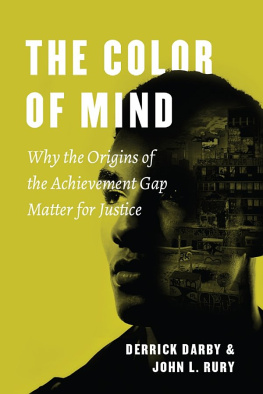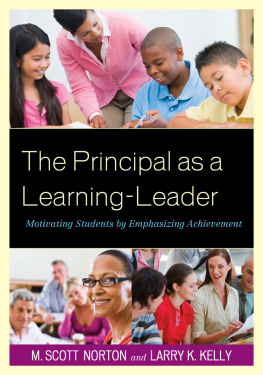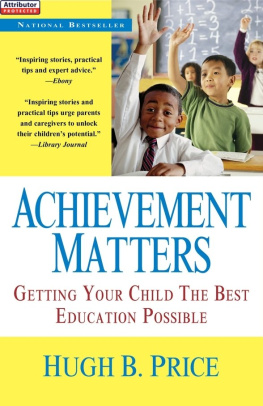The Color of Mind
The History and Philosophy of Education Series
Edited by Randall Curren and Jonathan Zimmerman
The Case for Contention: Teaching Controversial Issues in American Schools
By Jonathan Zimmerman and Emily Robertson
Have a Little Faith: Religion, Democracy, and the American Public School
By Benjamin Justice and Colin Macleod
Teaching Evolution in a Creation Nation
By Adam Laats and Harvey Siegel
The Color of Mind
Why the Origins of the Achievement Gap Matter for Justice
Derrick Darby and John L. Rury
The University of Chicago Press
Chicago and London
The History and Philosophy of Education Series is published in cooperation with the Association for Philosophy of Education and the History of Education Society.
The University of Chicago Press, Chicago 60637
The University of Chicago Press, Ltd., London
2018 by The University of Chicago
All rights reserved. No part of this book may be used or reproduced in any manner whatsoever without written permission, except in the case of brief quotations in critical articles and reviews. For more information, contact the University of Chicago Press, 1427 E. 60th St., Chicago, IL 60637.
Published 2018
Printed in the United States of America
27 26 25 24 23 22 21 20 19 18 1 2 3 4 5
ISBN-13: 978-0-226-52521-1 (cloth)
ISBN-13: 978-0-226-52535-8 (paper)
ISBN-13: 978-0-226-52549-5 (e-book)
DOI: 10.7208/chicago/9780226525495.001.0001
Library of Congress Cataloging-in-Publication Data
Names: Darby, Derrick, 1967 author. | Rury, John L., 1951 author.
Title: The color of mind: why the origins of the achievement gap matter for justice / Derrick Darby and John L. Rury.
Other titles: History and philosophy of education.
Description: Chicago: The University of Chicago Press, 2018. | Series: History and philosophy of education series | Includes bibliographical references and index.
Identifiers: LCCN 2017028628 | ISBN 9780226525211 (cloth: alk. paper) | ISBN 9780226525358 (pbk: alk. paper) | ISBN 9780226525495 (e-book)
Subjects: LCSH: African AmericansEducationUnited States. | Educational equalizationUnited States. | Academic achievementSocial aspectsUnited States. | Discrimination in educationUnited States. | Social justiceUnited States.
Classification: LCC LC2731 .D37 2018 | DDC 371.829/96073dc23
LC record available at https://lccn.loc.gov/2017028628
 This paper meets the requirements of ANSI/NISO Z39.48-1992 (Permanence of Paper)
This paper meets the requirements of ANSI/NISO Z39.48-1992 (Permanence of Paper)
Contents
What School Leaders Need to Know
Had this aspiring artist been admitted, superior artistic talents would not have spared her the indignity of being denied acceptance as a social equal. So, not surprisingly, given the caste spirit of the times, some people thought it better for a black student such as her to attend a racially segregated school, where her equal dignity would be respected. But it is hardly clear that this would have been an ideal solution. It is likely not one that the student would have preferred, given her application to the white school. Facing the doubts of others about their intellectual and creative abilities because of race haunted many black students in the past, and unfortunately such doubts remain pertinent today. If black people are to be educated within racially diverse schools, and achieve at levels comparable to white peers, we must debunk doubts about their intelligence, character, and conduct.
In 1935, when W. E. B. Du Bois asked, Does the location, and content of instruction have worked in tandem to deny blacks in America a proper education. Philosophy dictates that confronting the Color of Mind and its manifestation within racially diverse schools today is an imperative of justice.
The historical evidence we supply in this book shows that the Color of Mind has served to rationalize racially exclusionary school practices Du Bois was prescient in appreciating this.
Dignitary Injustice
Cooper and Du Bois raised concerns about inequality that pose a question about justice. Does justice demand that persons be able to relate to one another as equals in social, political, and legal terms? We think that it does, and this conception will
We do not deal with all forms of injustice in this book. Philosophical problems of distributive justice, for instance, will be mentioned only in passing. the equal dignity of all persons, as happens when schools prevent blacks and whites from relating as equals, constitutes a distinctive form of injustice, which we call dignitary injustice. So, more precisely, this book is about why the origins of the black-white achievement gap matter for understanding the operation of dignitary injustice in schools.
Our focus on dignitary as opposed to
To be sure, the concept of dignityits meaning, value, and implicationsis also a source of philosophical controversy. Still, given the role it has played in activist voices of African Americans such as Frances Ellen
From this ethical perspective, dignitary injustice results when laws, practices, or social arrangements constitute an affront to our equal status. The moral ideal of achieving social relations based on equal dignity is, therefore, essentially the same one that prompted Du Bois to suggest that it might be more readily attainable for black children in racially segregated schools. However deficient in resources Negro schools may have been, and such deficits were legion, Du Bois presumed that they would not be schools of dignitary injustice. Obviously, much has changed in America since 1935, and we are no longer living with the old Jim Crow. Yet Du Boiss concern about dignitary injustice in mixed schools remains distressingly relevant.
The influence of the Color of Mind also raises a justice concern about whether facially discriminatory school practices can be universally justified to American citizens, especially given the nations long-standing commitment to equality of educational opportunity. There are also the well-documented benefits of education, and the many ways This is clearly not the only injustice at issue in public education today, but it takes center stage in our story.
School leaders today need to know that some of what goes on behind school doorssuch as tracking, discipline, and special education practicesnot only creates disparities in educational achievement between black and white students but also precludes them from relating to one another as equals. And since racially segregated education is inherently unequal and unlawful, as the US Supreme Court ruled in Brown v. Board of Education, concrete steps are needed to tackle dignitary injustice in todays racially desegregated schools. This, as we shall argue, requires that school leaders conscientiously attend to the mutually reinforcing relationship between the Color of Mind and school practices. This book combines history and philosophy to uncover the racist origins of the black-white achievement gap to argue that this relationship is a problem of justice, and to explain what must be done to address it. We also aim to vindicate ongoing efforts by social justice school leaders to create institutions based on perfect social equality, where dignitary injustice no longer prevails within K12 schools.
The Concept of Race
Near the close of the nineteenth century, in the year following the Supreme Courts Plessy v. Ferguson decision ratifying separate but equal as a legal doctrine, Du Bois penned his now famous essay, The Conservation of Races.
With this deft observation, Du Bois makes the point that race is








 This paper meets the requirements of ANSI/NISO Z39.48-1992 (Permanence of Paper)
This paper meets the requirements of ANSI/NISO Z39.48-1992 (Permanence of Paper)